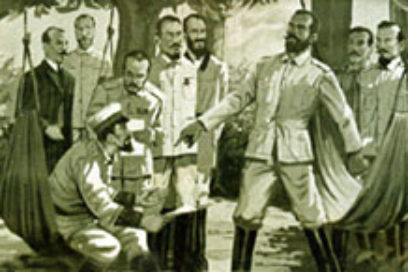General Antonio Maceo was one of the first to take up arms for the independence of Cuba in 1868. The members of his family, who had the social condition of peasants, blacks, freedmen, accompanied him in this revolutionary decision. It was his mother, Mariana Grajales, who at that crucial moment made him promise before a cross of Christ that he would give his all for the cause of Cuban independence.
The Baraguá Protest was the episode that demonstrated the will of the Cubans not to give up the purpose of conquering the independence and freedom of the slaves. The Protestants, chiefs and troops under the command of Antonio Maceo, gave a dignified response to the arrangements and compromises promoted by the House of Representatives of the Republic in Arms which, through the Center Committee, signed the Zanjón Pact with Spain. From our perspective, we refute the historical thesis that the Spanish high command, led by General Arsenio Martínez Campos, had succeeded in its campaign of military and moral attrition against all Cuban insurgents. The military parts of the colonial forces acknowledge that from the tactical point of view the campaigns led by the Spanish general had not had the expected success. What happened was that a good part of his troops concentrated on harassing the Mambí battalion "Jacinto" that in Camagüey accompanied the representatives of the Republic of Cuba in arms. It was thus that the Spaniards managed to sow discouragement in that troop subjected to constant persecution and scourging.
The combative successes that the other insurgent troops were conquering at that time, particularly those of Antonio Maceo in the Oriente province, showed that the conflict could be prolonged despite the problems of regionalism and the lack of existing supplies. The Baraguá Protest took place in rejection of Martínez Campos's pacification plan, which had managed to get the Center Committee to sign peace without having consulted the main Mambi chiefs, since said Committee abolished the "Spotorno Decree" that condemned the execution of those who agreed to a compromise with Spain without independence for Cuba. Maceo saved the dignity of the Cubans who felt ignored by that unconsulted surrender.
The new war leadership, led by Generals Antonio Maceo and Vicente García, tried to regroup the insurgent leaders who in different regions had opposed the Zanjón Pact as well as others who had laid down their arms assuming that they were obeying an agreement of the people of Cuba represented in the Republic in Arms. The dissatisfied insurgents made every effort to rally all the patriots, but when hostilities resumed, many Mambisa troops had disbanded and they could not be counted on.
Faced with this difficult situation, shortly after the fighting restarted, the Baraguá board of generals made the difficult decision to send General Antonio Maceo into exile to avoid the man who symbolized the dignity of Cubans from being arrested or killed. This new leadership convinced Maceo so that, with the prestige gained, he managed to prepare enough expeditions to allow the continuation of military operations. The little time available and other difficulties did not make the success of this endeavor possible and the mambisado's military campaigns were concluded for objective reasons but not for surrender or treason. The damage caused from the delivery of the weapons agreed by the House of Representatives could not be reversed.
The Baraguá Protest, although it could not specify the immediate continuation of the contest until achieving independence, left the political-ideological position of the new leadership of popular origin that led it well defined. The independence project of '68 was postponed, although a new liberation contest known as the Little War began shortly afterwards, which could not prosper for various reasons. However, the Cuban revolutionaries did not give up and continued their dispute for independence until on February 24, 1895, a new libertarian feat broke out.
José Martí, delegate of the Cuban Revolutionary Party, when he made an assessment of these events, declared that in the Zanjón "we had dropped the sword" and, when he reflected on the end of the war of 68, he wrote that he had the document before his eyes most beautiful in the history of Cuba: the Protest of Baraguá.


Deje un comentario